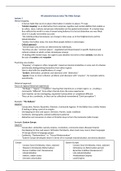All extensive lecture notes The Other Europe
Lecture 1
Mental mapping
- A human habit that we try to place information in relation to places maps
- ‘Mental mapping’ as an abstraction that comprises cognitive and mental abilities that enable us
to collect, store, retrieve and process information on the spatial environment a mental map
thus reflects the world in a way a human being believes it to be but distortions are very likely
since it is usually not entirely accurate
*the individual idea/stereotypes can change in time areas so in the Enlightenment and the
Industrialisation
*mostly: the further away, the more likely people believe in stereotypes
- Critical approach:
*mental maps vary as they are determined by individuals,
*but they are also ‘’common places’’, negotiated and disseminated in specific historical and
cultural contexts in which certain stereotypes emerge
dealing with mental maps, we ought to pay attention not only to their contents, but also to
the acts of creation and reception
Practicing area studies
- ‘’Mapping’’ of regions is often ‘pragmatic’, based on internal similarities or some sort of cohesion
and thereby distinguishing themselves from other regions
- How to deal with the simplifications of a map?
*borders: delineation, problems and obsession with ‘’distinction’’
*spaces: focus on inner cohesion, problems and obsession with ‘’essence’’, for example nations
and ethnicity
Historical approach
Focus on regional historical experiences
- ‘’Heritage’’/ ‘’legacy’’/ (‘’tradition’’) leaving their imprints on a certain region: i.e., creating a
community ‘’different’’ from others that do share the same experiences
- Such imprints can be overlapping, sequential (consecutive) or completely different
- They can be a continuity, or they can be collectively remembered (“joint perception”)
Example: ‘’The Balkans’’
Legacies:
- Consecutive: Roman, Byzantine, Ottoman, Communist legacies the Balkan has a similar history
if looking at being a part of an empire
- Overlapping (in time and space): Christian, Muslim, Judaic traditions
- Continuity: demographic outlook (settlement patterns)
- Abduction and conversion to Islam of Christian boys to form the Janissaries (elite troops)
Example: Eastern Europe
Legacies:
- Consecutive: similarities namely empires, revolutions, communist states (Russian Empire)
- Overlapping (in time and space): Orthodox Christianity, Islam (and many more); Slavic languages
Europe shown in language groups
- Continuity: ‘’Backwardness’’ vs. ‘’Forced Modernisation’’
*Eastern Europe developed slower in terms of for example industrialisation and democratisation
Europe Eastern Europe
- Contact Zone (Christianity, Islam, Judaism) - Contact Zone (Christianity, Islam, Judaism)
- (Western) Christianity (Reformation) - Orthodoxy (no Reformation period)
- Roman tradition (incl. Renaissance) - Byzantine tradition (Renaissance?)
- is Industrialisation
Where ‘Eastern Europe’? - Late industrialisation
- Nations, nation states - Multinational Empires
- Oversees colonisation - Land Empires
, 1. Eastern Europe: Russia, Ukraine, Belarus, (Baltic States, Finland)
2. (East) Central Europe: Poland, Hungary, Czech Republic and Slovakia
3. South East Europe (‘’the Balkans’’): Romania, Bulgaria, Yugoslavia, Albania, (Greece)
Lecture 2
Definition communism: communism is about the abolishing of the private ownership of the means of
production and everything has to be commonly owed/government (establishing equality)
Historical roots
Communist manifesto 1848: a capitalist society (a society based on private ownership) is subjected to a
process of polarisation: competition between companies which causes companies to go broke and people
to lose their job. Polarisation will inevitably become so immense, also because of the polarisation there
will be an economic crisis, which makes the capitalist system unworkable. The poor and rich against each
other. (Classes are linked to people with property or those who don’t have that) because of these two
reasons (poor and rich polarisation + unworkable capitalist system) a proletarian revolution is inevitable.
(Proletariat against bourgeoisie)
The idea of Marx was that nations are formations that have emerged at some point in history and in some
way, they will disappear again and the whole world will be communist/ a merged world
- Historical view of Marxism: history is a kind of sequence of certain social and economic
formations and one formation is followed by another as a result of class war and the struggle
between classes Marx expected such a class struggle to emerge in the context of the 1848
political mobilisation
“Social Question”
- Early 19th century Europe: negative effects of industrialization/capitalism:
*the proletariat was the class that had no property (peasants were oppressed but had a piece of
land, so they did have property!) many peasants were driven from their land by the capitalist
system which meant they had no longer any means of production so these people needed new
employment (work in factory: the basis of society so the most powerful and strongest class even
though they were the property-less class)
*the old way of ruling/running a state didn’t seem adequate anymore to address the social ills
and the impoverishment which was following these upheavals
- New social inequality (classes) replaces old (estates) critique of private control over means of
production
- Socialism was a broad movement that emerged from radical democracy and from progressive
nationalism Marx and Engels didn’t believe history was driven by ideals but that the world
through objective processes will develop towards communism (class struggle moving force in
history), whether you like it or not
Marxism: ‘Scientific’ socialism
- Critique of early socialist thinking as “naïve and unsystematic’’
- Marx studies textile industry in Lancashire (England) in the 1840s with Engels
- 3 sources: the utopian socialists, the German philosopher Hegel (Hegel’s idea: history develops
and people learn from the way they try out ideas) and the British political economists such as
Adam Smith and David Ricardo (economy is the basis of history labour is the only thing of
value)
Marxism: Basic tenets (important information!)
- (1) Philosophy: historical materialism: productive sphere understanding society and trajectory
as a whole, and the stages of historical development
- (2) Sociological: critique of capitalism: implications of commodity production, free market,
private ownership




